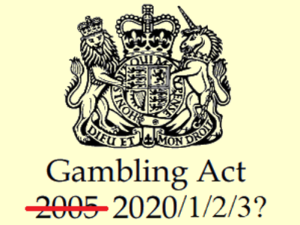What Would A Labour Government Do With Gambling Rules?
 There are many things that can cause extreme senses of division within the world of politics. The United Kingdom has felt irreversibly split since the vote to leave the European Union saw families divided and political parties falling over themselves to appease the winners, for example.
There are many things that can cause extreme senses of division within the world of politics. The United Kingdom has felt irreversibly split since the vote to leave the European Union saw families divided and political parties falling over themselves to appease the winners, for example.
For a lot of people, gambling isn’t something that is thought of as being overly political. In spite of the fact that it is the government that decides what the rules and regulations are around betting, you wouldn’t spend too long thinking about what the Prime Minister thinks about the bet you’re placing.
Interestingly, despite not having been in power since 2010, the Labour Party has had a bigger impact on gambling in recent times than the Conservatives. That is thanks to the fact that it was Tony Blair’s government that relaxed rules around betting in this country, with the Tories having to do what they could in order to shape things since they were elected to government. For Labour, therefore, gambling is a topic about which the party has mixed feelings. For some, Blair’s bet on Britain’s betting has proven to be a failure. For others, it simply needs a bit of tweaking.
The Impact Of The White Paper
 With an election not likely to come until 2024 at the earliest, the government’s White Paper on gambling, entitled ‘High Stakes: gambling reform for the digital age‘, is likely to influence the policy of the Conservatives around betting and gaming.
With an election not likely to come until 2024 at the earliest, the government’s White Paper on gambling, entitled ‘High Stakes: gambling reform for the digital age‘, is likely to influence the policy of the Conservatives around betting and gaming.
A call for evidence was launched in December of 2020, but it took more than two years for the response to be published. That was as much to do with the turmoil in the Tory Party over that time as anything else, but it is certainly suggestive of something that isn’t high on their list of priorities and might be a can they’d like to kick down the road.
They have suggested a number of different things that could happen, though. A statutory levy on the industry that would be used to treat gambling harm is one of the things in discussion, for example.
The creation of an independent gambling ombudsman is another. There are more complicated things that are being planned, though. Maximum stakes of £15 for online slots is something that is being discussed, whilst ‘unintrusive checks’ on gamblers who lose a certain amount of money is also up for discussion. These are potentially controversial, but if the government puts them in place there might not be much that Labour can do.
Keir Starmer’s Wishy-Washy Labour Party

The reality of Keir Starmer’s time in charge of the Labour Party is that it has been filled with reversals in policy depending on the way the popular wind appears to be blowing. When Greg Hands gave a speech at the Conservative Party conference, he brought out a pair of ‘Keir Starmer flip flops’ to emphasise the point. During the period of time that Starmer spent running for the party leadership, he promised he would bring public services back into governmental control, then once he became Leader he decide that, actually, privatisation would be a bad thing.
Similarly, the outsourcing of issues in the National Health Service was, he said, a bad thing. Not long after becoming Labour Leader, Starmer decided that outsourcing was a necessity. Similar such U-turns were performed over the likes of student tuition fees, taxing the top earners and reforming the House of Lords, to say nothing of his announcement when in Liverpool that he wouldn’t speak to a certain newspaper that is boycotted by the city when he was after votes to become Leader, only to write for said tabloid as soon as he became the party’s Leader.
None of which is to attack Labour just for the sake of it, but is instead to point out that what has been said about gambling by Keir Starmer’s Labour Party might not be all that trustworthy. The Labour leader appears to be happy to make whatever promise the people he’s speaking with at any given moment want to hear, only to go back on his word when it later suits him to do so. This is, at the veery least, worth bearing in mind when it comes to thinking about what any potential Labour government might do around gambling, should it be able to do anything at all.
History Suggests Inaction
 You might well imagine that a left-wing political party would be in favour of looking to clamp down on something like betting, given the extend to which gambling is a capitalist enterprise writ large. In actual fact, the recent history of the Labour Party is one that doesn’t suggest that much will happen to limit the extent of gambling’s reach.
You might well imagine that a left-wing political party would be in favour of looking to clamp down on something like betting, given the extend to which gambling is a capitalist enterprise writ large. In actual fact, the recent history of the Labour Party is one that doesn’t suggest that much will happen to limit the extent of gambling’s reach.
It was Tony Blair’s Labour that passed the 2005 Gambling Act that is the basis for the betting laws of today, with the Act in essence doing just three things: allowing Fixed Odds Betting Terminals to proliferate, loosened the restrictions on gambling advertising and allowing gambling establishments to open more easily.
Labour did form the United Kingdom Gambling Commission, but most people feel that that isn’t really fit for purpose. In the more modern era, Labour’s MPs haven’t exactly given anti-gambling groups cause to feel as though things are heading in the right direction.
One of the most out-spoken anti-gambling voices was that of Tom Watson, who left parliament and then became an adviser to the board of Flutter, the owner of companies such as Sky Bet and Paddy Power. Both Michael Dugher and Anna Turley, former Labour MPs, went on to become Chief Executive Officer and consultant respectively to the Betting & Gaming Council.
When Keir Starmer was engaged in the battle to become Leader of the Labour Party, he refused to publish the list of donors to his campaign until after the process was complete. As a result, we didn’t learn that one of those donors was Peter Coates, he of Bet365 fame.
One of the most recent statements on Labour’s approach to gambling was made in 2018, with Deputy Leader Tom Watson being the driving force behind it and Jeremy Corbyn still the Party Leader. In the end, though, it is likely that Labour are keeping their counsel over their attitudes to gambling in order to see what the government does.
Speaking in April of 2023, Starmer certainly seemed to suggest that they would back tighter rules. He said, “We do think regulations need to be tightened. We will look at what the government puts forward.”
Lucy Powell, Labour’s Shadow Culture Secretary, said, “We urgently need to update analogue gambling regulation so it is fit for the digital age, yet the Conservatives’ failure to govern means we are still waiting for proposals to be published and debated in Parliament.”
Sadly, none of that means all that much when Starmer has even backed out of previous manifesto pledges, let alone things said in press interviews.



